Updated: August 3rd, 2022
This article contains affiliate links. Read the full disclosure here.
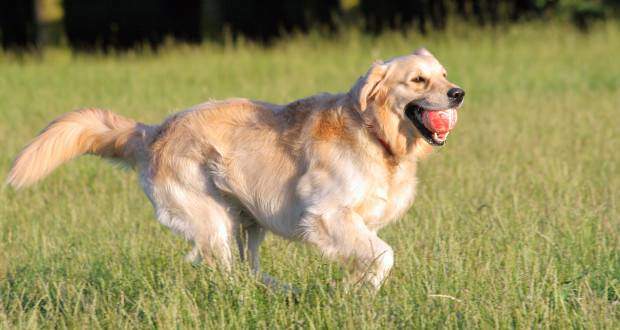
How Much Exercise Does a Golden Retriever Need?
All dogs need exercise to live a fit, healthy and fulfilling life.
No matter the breed, no matter how large or small, no matter their age, they all need exercise. But some need more than others.
So what are the Golden Retriever exercise requirements?
Golden Retrievers Are A High Energy Sporting Breed
As the name suggests, the Golden Retriever is a sporting breed initially created to retrieve fallen game for hunters in the Scottish highlands in the 19th century.
Retrieving in the Scottish Highlands, with its mountainous landscape pot-holed with ponds, lakes and streams is very physically demanding work.
So when they set out to create the Goldens, they had to be a high energy, sturdy breed with lots of stamina and an affinity for water.
They needed a dog that could travel large distances, hiking and swimming in rough terrain for the best part of a full day.
And with this breed, this is exactly what they got.
And although the Golden Retriever as a family pet isn’t required to perform such hard work, they still have the genetics tailored towards the role for which they were created.
So they have a body and mind made for physical activity and if they aren’t given sufficient exercise then you may not like the result.
A Golden Retriever That Isn’t Trained Well Becomes Destructive
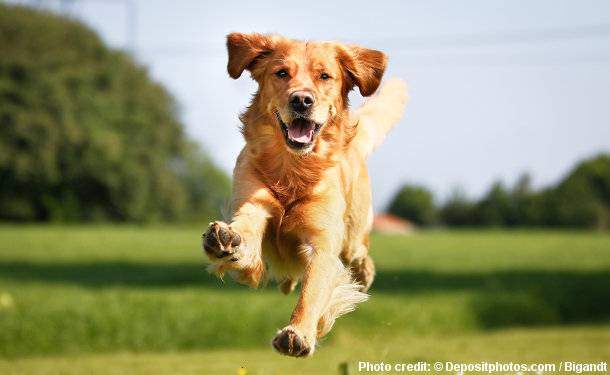
Golden Retriever Exercise: Lack of Exercise Leads to Destruction
This sporting breed craves physical activity. They need physical activity. And if they don’t get enough they store up so much unused energy and their minds become so bored that they simply have to find a release.
They become very destructive, chewing, digging, and running around your home and garden like little tornadoes. Too full of pent-up energy to be able to concentrate and behave themselves well and some will even try to escape their home and garden at every opportunity.
A lot of people who complain that their ‘Golden is out of control!’ simply haven’t exercised them enough. They haven’t met their dog’s basic needs and have created a dog that is literally bouncing off the walls just trying to burn off pent-up energy.
And this isn’t the only problem…
A Lack of Physical Activity Is Bad For Your Golden Retriever’s Health
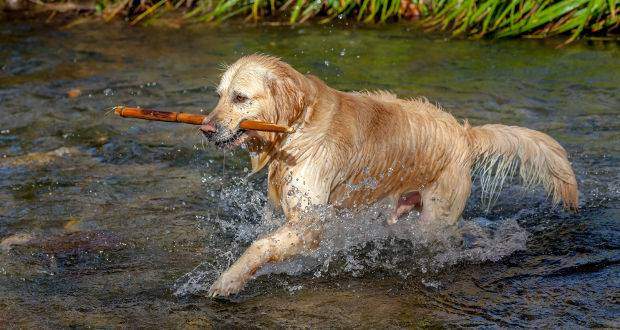
Golden Retriever Exercise: Lack of Exercise Harms the Health
Golden Retrievers love their food and will eat whatever’s put in front of them. They want to do this as they’re a sporting breed that would use a lot of energy if they were working in their original roles.
But if they’re stuck at home, barely exercised and just go out on the occasional walk, they still have that voracious appetite. Only now, all that food will just turn into fat and lead to poor health and weight issues.
Yes, Golden Retrievers are very prone to obesity. Usually a combination of their owners doing two things:
- Giving in too often to those expertly crafted begging routines. No matter how old the dog, they still show those irresistible puppy dog eyes when there’s food around!
- Not giving their pooch anywhere near a sufficient level of exercise.
It’s simple math that if calories going in are greater than the calories burnt, then the weight will be gained. So if a dog receives lots of treats and table scraps, and are not enough physically active, the pounds are going to pile on and fast and you’ll probably have to put your dog on a diet (and no one likes that!).
Excess weight leads to a variety of problems such as heart disease, increased risk of diabetes, high blood pressure and damage to their hip and elbow joints.
Keeping your Golden at a healthy weight is the responsibility of any caring owner.
How Much Exercise Does A Golden Retriever Need?
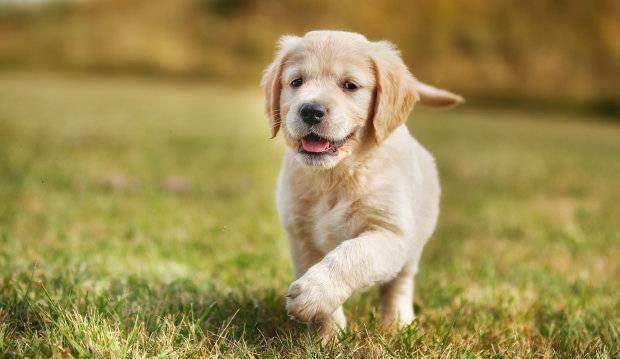
It varies with age, genetics and their overall health and fitness so there’s no one correct answer to cover every single dog.
I’ll do my best to summarize for different stages in a retriever’s life:
How Much Exercise Does A Golden Retriever Puppy Need
And also, are there puppy exercise limits you should be aware of?
A good rule of thumb for a puppy’s exercise needs is the ‘5 minute rule’. This rule basically states:
A puppy needs no more than 5 minutes of exercise for each month it has been alive.
So a 3-month-old puppy needs only 15 minutes exercise per day, a 5-month-old needs 25 minutes.
This exercise is a proper, structured exercise. Meaning brisk walking on leash, gentle games of fetch. It’s in addition to and not instead of general play.
A puppy can play as much as they wish though you do need to be careful that they don’t exercise too much.
Puppies are growing fast and their bones and joints can be easily damaged by over-exercising. So take it easy until they’re more mature. Follow the 5 minute rule and encourage very little jumping or vigorous exercise!
Continue the 5 minute rule until your golden is nearing one year old. And then…
How Much Exercise Does An Adolescent Or Adult Golden Retriever Need?
As a general rule to follow, a healthy adult Golden retriever exercise needs consist of a good hour of exercise every day. But the genetics of your dog could mean you need to increase or decrease this.
Those retrievers from a working field line will be more energetic and have higher exercise needs, perhaps as much as 2 hours per day. Whereas those from show lines could get by on 45 minutes.
There’s no hard and fast rule, but an hour+ per day is a good place to start and then ramp it up if necessary.
But all Goldens need regular exercise, at least twice per day or they will become bored and probably destructive. Try to provide different forms of exercise such as hiking, running, swimming, playing fetch…you need to stimulate their minds as well as their hearts and muscles.
And don’t ever worry about exercising a healthy Golden too much! They will take every bit of physical activity you throw at them and then be able to do much more. You will tire yourself out long before you can tire them!
How Much Should You Exercise An Elderly Golden Retriever?
Some Golden retrievers suffer arthritis and other joint pains as they age. If this is the case with your dog, please speak to your vet and follow their advice. With some ailments exercise can make things worse and you do not want that for your dog.
Others may start to slow down once they’ve hit their 8th birthday, whilst some may still be surprisingly active at their 12th year and beyond!
Like humans, dogs are individuals and age differently. Just be mindful of not asking too much of your elderly dog.
They’re a breed that loves to please and if you ask too much of them they will do everything to oblige and you could really tire them out and perhaps do more harm than good.
Monitor your Golden and if they seem to have aches and pains, or get out of breath a lot quicker, or take a lot longer to recover, then it’s maybe time to allow them to slow down. They can still enjoy walking long distances and swimming, just avoid jumping hedges and chasing balls for an hour straight.
How Do You Know If Your Golden Retriever Isn’t Getting Enough Exercise?
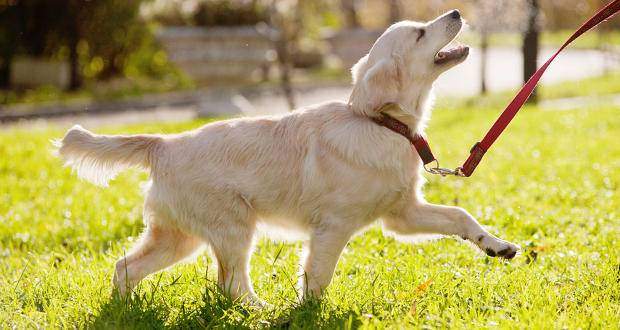
You’ll know. Believe me, you will know!
If you have an adolescent or adult Retriever who is almost literally bouncing off the walls, chewing all your belongings, cannot pay you any attention and is very hard to train, just generally seems to be out of control, there is a very high possibility you aren’t exercising them enough.
Or if your dog is piling on the pounds even though you’re feeding them according to the instructions with their food and not giving them lots of extra treats, then it’s highly likely you aren’t satisfying your Golden Retriever’s exercise needs.
But if your dog looks strong and athletic, is able to relax, pays you attention and will respond to proven commands they’ve been trained to follow it’s a fairly safe bet that they are receiving enough exercise.
In all cases, if your Golden has behavioral problems and seems highly strung and out of control, the first thing you should do is have them checked by a vet for health issues. And if they receive a clean bill of health then the simplest of cures for a better behaved dog is to exercise them more.
Try it for a few days, you just may be surprised at the results:
An exercised Golden is a calm and happy Golden!
Conclusion
Golden Retrievers are a high energy sporting breed and require a lot of exercise.
A lack of it can lead to a variety of health problems, hyperactivity and behavioral problems! So for a healthy and happy dog…and owner…provide your beloved puppy with just as much physical activity as they need and deserve!
If you’re the type of person who likes to stay at home with their feet up in front of TV, a Golden Retriever isn’t the right breed for you.
But if you’re an outdoor sporty type, you have the perfect dog!
Or if you’ve always had aspirations to get more active, well, you have the perfect dog! Your excuses to skip exercise may have been good enough for you, but they won’t be good enough for your highly energetic dog…and hence your belongings or your sanity too!.
Jogging alongside you, running along as you cycle, going for long hikes, the occasional swim and sessions of playing fetch all qualify as good Golden Retriever training. You will stay fit and active and happy together.

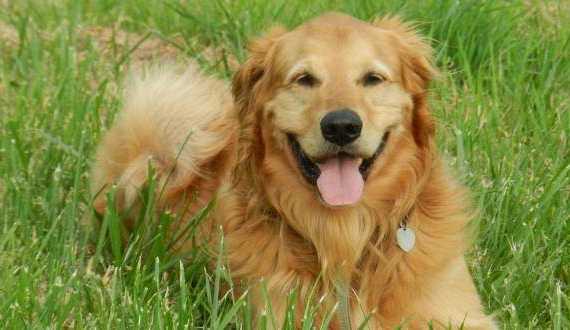
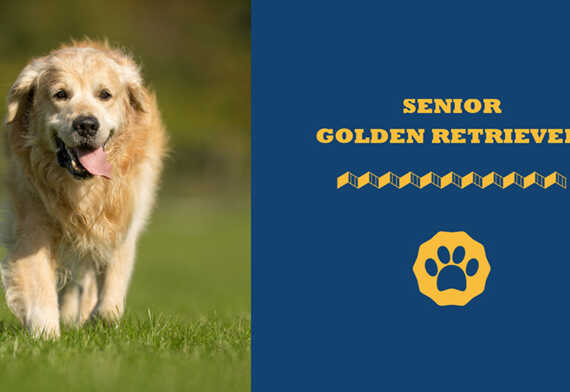

9 Comments
nigel smith
after i have taken my retriever to the beach for a couple of hours of swimming and walking. once home he starts limping on his back left leck he struggles to put his paw flat on the floor after about 5 minutes of him walking his limp suddenly stops but starts again after he has rested. anyone got any tips on this
Wendy
Hi Nigel. You really should see a vet for this. Anybody elses opinion will be purely guess work, and could prevent you getting treatment for your pooch if it turns out he needs it but you follow somebody’s guess work advice on the web. So yes, please see a vet 🙂
Mark
Go to the vet,your dog has probably tore a muscle or something which means if you dont get it checked out soon your dog will likely get worse and get anxious when wanting to iump around and play exiting games. Trust me… GO TO THE VET
james
really works…been walking mine for 3 dys now and her attitude has changed…more still, happy ,eats better and sleeps better.
Mark
VET RIGHT AWAY
kathleen mangan
Hi Wendy , Thanks for your good advice. I have a 12 week old Golden Retriever who is very active . Have just started walking her so the 5 min rule had been a good guideline .
Many thanks
Kathleen
ESTEFANIA
Thanks for this article! I’m quite a lazy person so I was guessing if I could walk my 1.5 years old dog less than the actual 2 hours per day he’s getting now. I guess I’ll never be able to be lazy again . At least he’s a cute motivation for exercising
Lara
Hi Wendy,
We have an English Cream Golden, and my main form of exercise is running. My Golden started out pretty energetic and was able to run 4-5 miles along with our other high strung kelpie mix dog, but has steadily decreased his activity level to the point that now, although he wants to come along on runs, he slows down after a few blocks and can barely do a two mile walk without me having to coax or pull him. When we do run, it isn’t fast, maybe 9:30 or 10:00 min miles. Where I can, I take off his lease and he runs better when off lease, or enjoys galloping when there is a long patch of grass. He doesn’t seem to be in pain, but I wonder if this is normal. I wonder if I should just try and force him to keep going and/or bring him out longer to get back in shape. He is 7, but that seems too young for him to be this inactive. I will say that he perhaps has always enjoyed relaxing, since he likes to play tug when laying down on his belly !!! Thanks for any feedback. Lara
Susan
Thank you so much for this article!! I have a four month old Golden that I love to pieces, obviously – who wouldn’t! – but have been worrying about giving him enough exercise. This clarifies things so well for me! I now know that the 20mins isn’t ALL the exercise he needs for one day, but an ADDITION to our play times at hime and his “poo drop”. He hadn’t been getting enough exercise poor thing, it’s no wonder he’d kept prowling the living room in circles , looking longingly at the door and generally becoming a pain in the neck. Now we do a 20-min walk and I can just see and tell how much better he feels. Happier and calmer. Again, thank you:)